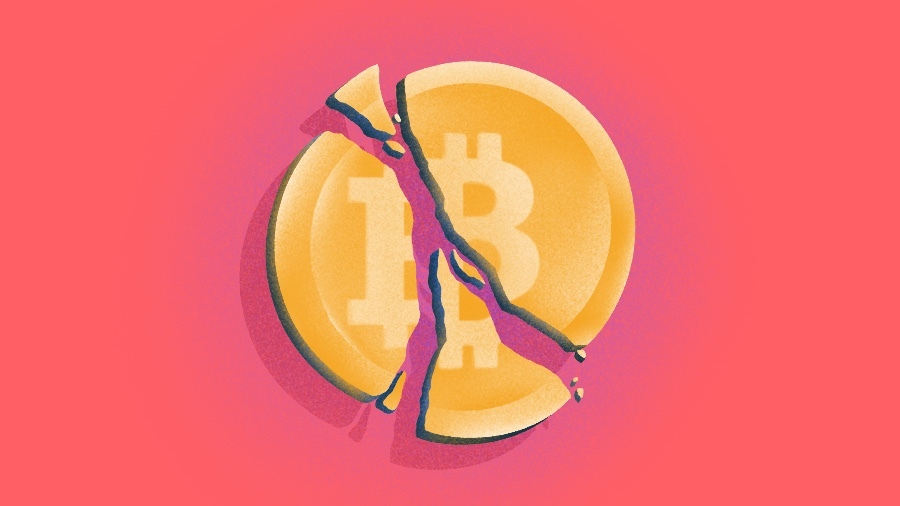Sam Bankman-Fried’s trial kicked off this week in a Manhattan federal courthouse. The disgraced crypto wunderkind faces seven counts involving fraud and conspiracy charges related to the implosion of crypto exchange FTX.
The spectacularly colossal nature of SBF’s downfall has impacted not only the crypto startups and venture funding in the sector, but also venture capital in general.
FTX’s collapse is the greatest startup and investor failure of all time. For perspective, Theranos had raised about $1.3 billion in funding and had a $10 billion valuation at its peak before the walls came tumbling down on Elizabeth Holmes and Sunny Balwani. While that infamous debacle gave us a movie, Bankman-Fried’s FTX and its U.S. exchange, FTX US, had raised a combined $2.2 billion at a $32 billion valuation and $8 billion valuation, respectively, before everything fell apart.
Crypto contagion
Everything changed for the crypto sector after FTX filed for bankruptcy on Nov. 11, 2022.
Crypto contagion gripped the industry — startups including Genesis and Voyager eventually declared bankruptcy, while others announced layoffs (which continues, as just this week crypto transaction tracking firm Chainalyis laid off 150 employees).
Not surprisingly, the collapse also affected venture funding in the crypto sector.
From the start of 2022 to the day FTX declared bankruptcy, crypto startups had raised $14.5 billion in 1,312 different funding deals (that of course includes both FTX’s and FTX.US’s $400 million raises earlier that year), per Crunchbase data.
Since Nov. 11, crypto startups have raised less than $3.7 billion on only 695 deals, according to Crunchbase data. The biggest deal was Singapore’s Amber Group’s $300 million raise in December to help combat FTX’s fall. Others, such as Switzerland-based Islamic Coin and France-based crypto hardware maker Ledger, have also raised large six-figure rounds.
While it is certainly fair to point out all of venture is significantly down — especially between 2021 and the early part of 2022 — crypto has taken a hit just from the second half of last year.
In Q3 of last year — just before FTX’s fall — startups in the crypto space raised $1.9 billion in 279 deals, Crunchbase data shows, outpacing what has occurred since FTX’ bankruptcy in terms of both dollars and dealmaking.
Venture changes
The dollars in crypto may not be the only change the collapse of FTX sparked.
Back in August, the Securities and Exchange Commission adopted new rules for venture capital and other private fund advisers.
The new rules included mandating side letters — preferential terms given to some investors — be disclosed to all inventors, as well as quarterly reporting of performance metrics and third-party mandates.
The new rules did not go as far as an earlier proposal did. That proposal would have included opening the door for LPs to push litigation against an investor if proper due diligence was not followed in a deal — something VCs have not had to worry about before.
While the due diligence scrutiny seems the most pertinent to the FTX debacle, it’s worth noting that the SEC and venture capitalists have traditionally lived worlds apart. The passing of any new rules that push for more transparency may not be completely attributable to what went on at FTX, but it also is hard to believe it didn’t play some role. At the very least, the crypto exchange’s collapse likely generated more interest at the SEC and other regulators to examine the growing venture industry.
It is also worth noting that just because the due diligence provisions did not pass, it does not mean it cannot be revisited in the future — perhaps reignited by what may come out in the current trial.
It is worth noting earlier in the year, it was reported the agency wanted to probe what type of due diligence investors in FTX did.
While Bankman-Fried’s future will be decided by a jury of his peers, some of FTX’s legacy already has been decided by venture capitalists, government regulators and others.
However, it is likely that legacy is only partially written.
Pro query:
Further reading:
Illustration: Dom Guzman
Search less. Close more.
Grow your revenue with all-in-one prospecting solutions powered by the leader in private-company data.


Stay up to date with recent funding rounds, acquisitions, and more with the Crunchbase Daily.
For the first three quarters of 2023, global startup funding reached $221 billion, marking a 42% decline. Early-stage funding showed the steepest…
It’s been a busy week once again in AI, especially when it comes to investing and valuing it.
Venture funding to legal tech startups is pacing this year to hit about $725 million, per Crunchbase data. That’s a steep decline from the past two…
- SEO Powered Content & PR Distribution. Get Amplified Today.
- PlatoData.Network Vertical Generative Ai. Empower Yourself. Access Here.
- PlatoAiStream. Web3 Intelligence. Knowledge Amplified. Access Here.
- PlatoESG. Carbon, CleanTech, Energy, Environment, Solar, Waste Management. Access Here.
- PlatoHealth. Biotech and Clinical Trials Intelligence. Access Here.
- Source: https://news.crunchbase.com/fintech-ecommerce/sbf-ftx-trial-crypto-vc-investment/
- :has
- :is
- :not
- $3
- $400 Million
- $UP
- 1
- 11
- 150
- 2021
- 2022
- 2023
- 7
- 9
- a
- About
- acquisitions
- adopted
- affected
- After
- again
- against
- agency
- AI
- All
- all-in-one
- already
- also
- an
- and
- announced
- announced layoffs
- any
- apart
- AS
- At
- AUGUST
- Bankruptcy
- BE
- because
- been
- before
- believe
- between
- Biggest
- Billion
- both
- busy
- but
- by
- came
- cannot
- capital
- capitalists
- certainly
- change
- changed
- charges
- Close
- Collapse
- combat
- combined
- come
- comes
- completely
- Conspiracy
- Contagion
- continues
- course
- CrunchBase
- crypto
- crypto exchange
- crypto sector
- crypto space
- crypto startups
- Current
- daily
- data
- Date
- day
- deal
- Deals
- December
- decided
- Decline
- DID
- different
- diligence
- does
- dollars
- Door
- downfall
- due
- Earlier
- Early
- early stage
- employees
- end
- especially
- eventually
- everything
- examine
- exchange
- Failure
- fair
- Fall
- far
- Federal
- filed
- Firm
- First
- followed
- For
- fraud
- from
- FTX
- fund
- funding
- funding deals
- funding rounds
- future
- gave
- General
- generated
- given
- Global
- Go
- Government
- greatest
- Growing
- had
- Half
- Hard
- Hardware
- Have
- help
- his
- Hit
- HTML
- HTTPS
- if
- impacted
- implosion
- in
- included
- includes
- Including
- industry
- infamous
- interest
- Inventors
- investing
- investor
- Investors
- involving
- IT
- ITS
- jpg
- just
- large
- Last
- Last Year
- layoffs
- leader
- least
- Legacy
- Legal
- Legal Tech
- less
- likely
- Litigation
- LPs
- maker
- mandates
- mandating
- marking
- May..
- mean
- Metrics
- million
- more
- most
- movie
- Nature
- New
- noting
- occurred
- of
- off
- on
- once
- only
- Other
- Others
- out
- part
- pass
- Passing
- past
- Peak
- peers
- per
- performance
- perhaps
- perspective
- plato
- Plato Data Intelligence
- PlatoData
- Play
- Point
- powered
- private
- probe
- proper
- proposal
- Push
- Q3
- raise
- raised
- raises
- reached
- Reading
- recent
- Recent Funding
- Regardless
- Regulators
- related
- Reporting
- Reuters
- revenue
- Role
- rounds
- rules
- s
- sbf
- SBF’s
- scrutiny
- SEC
- Second
- sector
- seems
- seven
- showed
- Shows
- side
- significantly
- since
- Singapore’s
- Solutions
- some
- something
- Space
- sparked
- start
- startup
- startup funding
- Startups
- stay
- such
- taken
- tech
- tech startups
- terms
- than
- that
- The
- The Future
- third-party
- this
- this week
- this year
- three
- time
- to
- Tracking
- traditionally
- transaction
- Transparency
- trial
- two
- type
- u.s.
- us
- Valuation
- valuing
- VCs
- venture
- venture capital
- venture-funding
- Verdict
- very
- wanted
- was
- week
- WELL
- went
- What
- when
- which
- while
- will
- with
- world’s
- worry
- worth
- would
- written
- year
- Your
- zephyrnet











